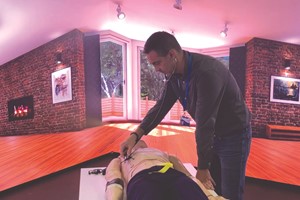Valvular heart disease, a condition affecting 2.5 percent of Americans and particularly prevalent among those over 80 years old, claims roughly 25,000 American lives annually. However, a collaborative effort by researchers from Rutgers Health, led by Partho Sengupta, Henry Rutgers Professor of Cardiology, sheds light on significant advancements in technology and ongoing clinical trials that could drastically reduce this toll.
In a paper published in The Lancet, Sengupta and his team outline a transformative shift in the diagnosis and treatment of valvular heart disease. Traditionally, physicians relied on stethoscope-based detection, often resulting in late-stage diagnoses. However, emerging technologies, including artificial intelligence (AI) and wearable devices, are revolutionizing early detection and monitoring capabilities. AI algorithms, fueled by data from electrocardiograms and wearable devices, can detect subtle indicators of valvular heart disease, enabling earlier intervention and improved outcomes.
Moreover, primary care physicians could soon integrate portable ultrasound devices and AI into routine checkups, democratizing access to early diagnosis for high-risk patients. This paradigm shift towards proactive screening aligns with the mission of the Center for Innovation at Robert Wood Johnson University Hospital, which has been at the forefront of pioneering medical technologies since its establishment in 2022.
While no medications are currently approved for treating valvular heart disease, ongoing clinical trials offer hope. Statins, PCSK9 inhibitors, and DPP-4 inhibitors are being investigated for their potential to slow disease progression, particularly in aortic stenosis cases exacerbated by cholesterol. Notably, Rutgers and RWJBarnabas Health are actively involved in clinical trials testing experimental therapies aimed at halting disease progression.
Surgical interventions, including transcatheter valve replacements, have emerged as less invasive alternatives, but concerns remain regarding the longevity and performance of prosthetic valves. However, ongoing research into more flexible prosthetics and resorbable valvular prostheses offers promising solutions. These innovations, if successful, could significantly improve outcomes, particularly for younger patients requiring multiple valve replacements over their lifetimes.
The groundbreaking work conducted by physician-scientists from RWJBarnabas Health and Rutgers Health will be showcased at the upcoming American College of Cardiology’s ACC Annual Scientific Session & Expo. With 59 abstracts accepted, this extensive portfolio underscores the institutions' commitment to advancing cardiovascular care through rigorous research and innovation.
The convergence of cutting-edge technology, pioneering research, and collaborative clinical trials heralds a new era in the management of valvular heart disease. As Professor Sengupta emphasizes, embracing these advancements is paramount in the ongoing fight against this debilitating condition, offering hope for improved outcomes and enhanced quality of life for patients worldwide.













